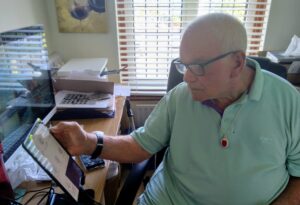 The CONNECT project, which launched in West Wales at the very beginning of the pandemic last March, is a community support project using both technology enabled care (TEC) and human support. Covering individuals who are older, need home care support, and live at home, it is run by Carmarthenshire County Council’s (CCC) Delta Wellbeing team and covers Carmarthenshire, Ceredigion and Pembrokeshire. To date, they have assessed 1,800 people, supported 8,500 individuals isolated during lockdown with necessities like food, made 18,500 proactive wellbeing calls in the first three months, responded to 1,646 call outs with fewer than 100 requiring emergency services, and responded to over 500 falls with 97 percent within 60 minutes. The CCC is using Tunstall kit for alarms, fall detection, GPS tracking, and 24/7 community response service. Delta Wellbeing is a Local Authority Trading Company, completely owned by CCC, and is the largest digital monitoring platform in Wales. Wales Herald
The CONNECT project, which launched in West Wales at the very beginning of the pandemic last March, is a community support project using both technology enabled care (TEC) and human support. Covering individuals who are older, need home care support, and live at home, it is run by Carmarthenshire County Council’s (CCC) Delta Wellbeing team and covers Carmarthenshire, Ceredigion and Pembrokeshire. To date, they have assessed 1,800 people, supported 8,500 individuals isolated during lockdown with necessities like food, made 18,500 proactive wellbeing calls in the first three months, responded to 1,646 call outs with fewer than 100 requiring emergency services, and responded to over 500 falls with 97 percent within 60 minutes. The CCC is using Tunstall kit for alarms, fall detection, GPS tracking, and 24/7 community response service. Delta Wellbeing is a Local Authority Trading Company, completely owned by CCC, and is the largest digital monitoring platform in Wales. Wales Herald
WelcoMe is an free app that enables businesses to better support the needs of their disabled customers or patients. It’s designed for use on mobile or desktop so that a person can create a simple profile that outlines personal key requirements and information about what support they need during their visit. Those requirements are communicated to the business or practice staff so that they can be ready on arrival. It makes for an easier visit all around and eliminates surprises. This Editor discovered WelcoMe through an announcement by the The London Centre for Cosmetic Dentistry, the first UK dental practice to adopt the app for their practice. There is a small fee for businesses–£30/mo plus a £49 onboarding fee. The app was developed by Neatebox Limited. Release (PDF). Hat tip to Suzy Ellis of Ellis & Boyd PR
X-on Surgery Connect, a provider of cloud telephony for primary care surgeries, has added another 116 practices in Greater Manchester (Stockport’s 36 practices) and London (80 practices within North Central London Clinical Commissioning Group). The Surgery Connect system provides telephone triaging, call center support, remote working support, telehealth remote consultation and video support. The deployment covers approximately one million patients, out of a total of 8.5 million patients in 835 practices in England and Wales. Unfortunately the release was supplied only via email and not online/PDF.
Arc Health remote diagnostic platform has been installed in 46 care homes in South East London. Arc’s video clinical exam and diagnostic technology connects the care homes to primary care surgeries via guided or patient self-use of Arc’s exam tools. The Arc kit used in the care home includes a stethoscope, blood pressure, pulse, and a camera wand to perform ear and throat exams and connects to a video platform that captures the information. Arc Health is part of the National Innovation Collaborative funded by NHSX. The care homes are part of South East London CCG, and the Lambeth Together and One Bromley borough health and care partnerships. Release on HealthTechDigital.
Alcove has inked a contract with Suffolk County Council (SCC) valued at £75 million over three years. Renewal is possible for another four years on an annual basis. According to UK Authority, Alcove will be developing a “new operating model for leveraging care technologies and data in the adult social care sector, with the potential to take this into wider health and care.” The procurement contract will be available for other authorities, fire and rescue, ambulance, probation, and community services in the east of England. SCC has been using Alcove technologies, including their Carephone service, to keep isolated older people connected with services during the pandemic.








Most Recent Comments